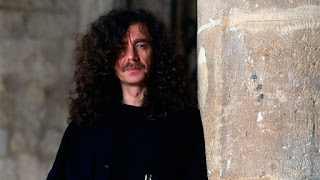Once Upon a Time
James Dillon
When the premiere of a work called ‘Once Upon a Time’ at the
Huddersfield Festival of 1980, James Dillon was immediately thrust
centre stage. Hitherto, James Dillon's
success had been variable. Mainly
learning his craft in libraries rather than formal institutions and without the
prospect of a performance at the end, many of his early pieces were left
incomplete. The first substantial work Babble
(1974-6) was a brief glimpse of things to come.
Although now James Dillon disregards the rigorous architectural design
in which everything 'is mapped out despite the material'. After the first section was rehearsed by the
newly formed Charles Ives Choir who were perplexed by some of the graphic
notation, the work was abandoned. His
momentary interest in serialism in ‘Dillug-Kefitsah’ (1976) encouraged James
Dillon to examine the seemingly paradoxical notion of a 'parametrical
discipline' working against an ‘experimental freedom’. As a result, he had cultivated such a real
sense of artistry that he was enabled to publicly document his 'first
work'. Finally, he had begun to
unshackle himself from the problems of infrastructure which had dogged his
earlier works (a difficulty which is perhaps more evident for a largely
self-taught composer). However, this
work was not yet a solution to the kind of schism between ‘process’ and ‘form’
that he had encountered in the earlier work ‘Babble’. What was needed was a completed re-evaluation
of the process of composition. Around
this time, Xenakis produced his inspired thoughts on the essential aspects of
composition in a book called Formalised Music.
Now, James Dillon was encouraged to reject the notion of heterophony
(counterpoint, melody, harmony) and serialism that was very much a concern of
his contemporaries for an amorphous texture generated by generalised
principles. Perhaps unconsciously,
James Dillon was about to create his own individual style as characterised in ‘Once
Upon a Time’. However, and this is
perhaps what makes James Dillon such an interesting figure, such a
straightforward analysis of his early work as a composer is somewhat naïve, especially
when the two previous works written around the same time are taken into
consideration. The solo clarinet work ‘Crossing
Over’(1978) uses material from a wide range of sources and so does the solo
drum work that followed, ‘Ti.re-Ti.ke-Dha’(1979). The title of the latter work is derived from
the verbal instructions given to drummers of North Indian Classical Music (‘Dha’
indicates both hands in the centre; ‘Ti’ is a kind of 'rim-shot' etc...). Combinations of words indicate a ‘Tal’ or a
repetitive rhythmic pattern and the title of the James Dillon piece appears to
be a fragment of one just like the third and fourth beats of the Ektål:
1 2 3 4
Dhin Dhin Dhage Ti.ra.ki.ta
etc...
In this respect, James Dillon’s music represents an apparent
contradiction; rigorous in terms of application but derived from a diverse inspiration. This indicates a powerfully creative but strongly independent mind.
https://en.wikipedia.org/wiki/James_Dillon_(composer)
http://www.fonemaconsort.com/blog-archives/#james-dillon
https://en.wikipedia.org/wiki/James_Dillon_(composer)
http://www.fonemaconsort.com/blog-archives/#james-dillon
